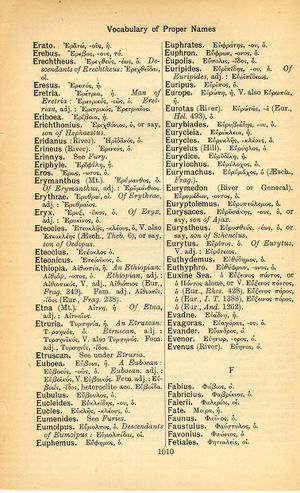Eteocles
Ὁ μηδὲν εἰδὼς οὐδὲν ἐξαμαρτάνει → Quicumque nihil (nil) scit, ille vir peccat nihil → Ein Mann, der ohne Wissen ist, macht auch nichts falsch
English > Greek (Woodhouse)
Ἐτεοκλῆς, -κλέους, ὁ, V. also Ἐτεοκλέης (Aesch., Theb. 6), or say, son of Oedipus.
Latin > English (Lewis & Short)
Ĕtĕōclēs: is and ĕos, m., = Ἐτεοκλῆς,
I son of Oedipus and Jocasta, brother of Polynices; he was the cause of the Theban war, described by the Roman poet Statius in the Thebais, Cic. Off. 3, 21, 82; Hyg. Fab. 76; gen. Eteoclis, Stat. Th. 3, 214: Eteocleos, id. ib. 12, 421; acc. Eteoclea, id. ib. 7, 688.— Hence,
II Ĕtĕōclēus, a, um, adj., of Eteocles: contentiones, App. M. 10, p. 245, 30.
Latin > French (Gaffiot 2016)
Ĕtĕŏclēs,¹⁶ is ou ĕos, m. (Ἐτεοκλῆς), Étéocle [fils d’Œdipe, frère de Polynice qui vint guerroyer contre lui ; ils s’entretuèrent dans un combat] : Cic. Off. 3, 82 || -ēus, a, um, d’Étéocle : Apul. M. 10, 14.
Latin > German (Georges)
Eteoclēs, is u. eos, m. (Ετεοκλης, der Sohn des Ödipus, Bruder des Polynices, der durch seine Weigerung, dem Bruder abwechselnd ein Jahr ums andere die Herrschaft zu überlassen, die Veranlassung zum thebanischen Kriege gab, den der röm. Dichter Statius in zwölf Gesängen schildert, Cic. de off. 3, 82. Hyg. fab. 76: Genet. -is, Stat. Theb. 3, 214; od. -eos, ibid. 12, 91 u. 421: Akk. -ea, ibid. 2, 384 u.a. – Dav. Eteoclēus, a, um (Ετεόκλειος), eteoklëisch, contentiones, Apul. met. 10, 14.

